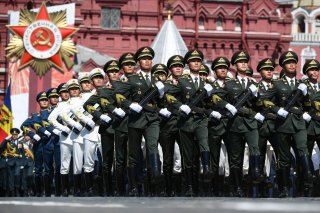Donald Trump Should Be Worried: The U.S. Military Could Fall Behind Russia and China
It is already happening in certain areas.
The U.S. military is in jeopardy of falling behind Russia and China in some crucial areas of weapons and technology, including hypersonics, AI and quantum computing, according to senior Congressional leaders.
Senator Jim Inhofe, Chairman of the Senate Armed Services Committee, issued a straightforward message to both Russia and China from the Senate floor June 25th while making a case for a strong 2021 military budget, flatly saying “there is no way you can defeat us—so don’t even try.”
Inhofe provided a lot of detail about strategic, political, economic and military concerns regarding both Russia and China, citing massive increases in the military budgets of both countries.
“China increased its military spending by 83 percent from 2009 to 2018. Over essentially the same time frame, Russia grew its defense budget by 35 percent,” Inhofe said. He made the point that Russian and Chinese military expansion was by no means limited to size and scope but, perhaps of equal or greater significance, massively invested in technological progress.
“Last October, China paraded a hypersonic weapon, showing off a technology we don’t even have yet,” Inhofe said.
Inhofe offered a number of specific reasons why both China and Russia concerns are fast-growing at the Pentagon. Among the military’s worries are Chinese global economic and military expansion, such as Beijing’s incursions into Africa with the construction of a new military base right near U.S. forces in Djibouti. He also made a point to emphasize growing antagonistic behavior toward the United States, Taiwan and other allies in the Pacific region.
Inhofe did not stop with the Pacific but also made reference to China’s killing of twenty Indians along the border in their recent clash, and criticized Russia’s support of the Assad regime in Syria.
A strong, growing military budget prioritizing near-term modernization as well as longer-term oriented science and technology research are needed for the innovations to win any future war. Along these lines, Inhofe did say progress was being made with respect to a number of needed technical leaps forward, such as current weapons development efforts at Fort Sill, Oklahoma.
“Right now, we’re outranged and outgunned by Russia and China. Fort Sill is leading the Army’s modernization efforts on long-range precision fires to restore our combat advantage,” he said.
With this example, he was likely referring to the Army’s Extended Range Cannon Artillery and Precision Strike Missile programs engineered to massively expand the attack range and effectiveness of U.S. weapons systems. The ERCA, for example, has already fired 155m artillery close to 70km and Army developers have now fired three test shots of its Precision Strike Missile, a new weapon intended to fire as far as 500km.
“The current missiles can go about 350 km and this will go beyond 500 km eventually. We are almost doubling the range with existing launchers so we are not having to invest in new launchers. We can now put two missiles in the launcher as opposed to what we can do now, which is one,” General John Murray, Commander, Army Futures Command, told TNI in a recent interview about the new weapon.
In his remarks, Inhofe also expressed strong support for the House Armed Services’ Committee’s Indo-Pacific initiative, a legislative proposal seeking to add $6 billion in funds to step up U.S. weapons and forces in the Pacific.
“We know that the way we preserve peace is by demonstrating our strength,” he said.
Kris Osborn is the new Defense Editor for the National Interest. Osborn previously served at the Pentagon as a Highly Qualified Expert with the Office of the Assistant Secretary of the Army—Acquisition, Logistics & Technology. Osborn has also worked as an anchor and on-air military specialist at national TV networks. He has appeared as a guest military expert on Fox News, MSNBC, The Military Channel, and The History Channel. He also has a Masters Degree in Comparative Literature from Columbia University.
Image: Reuters

